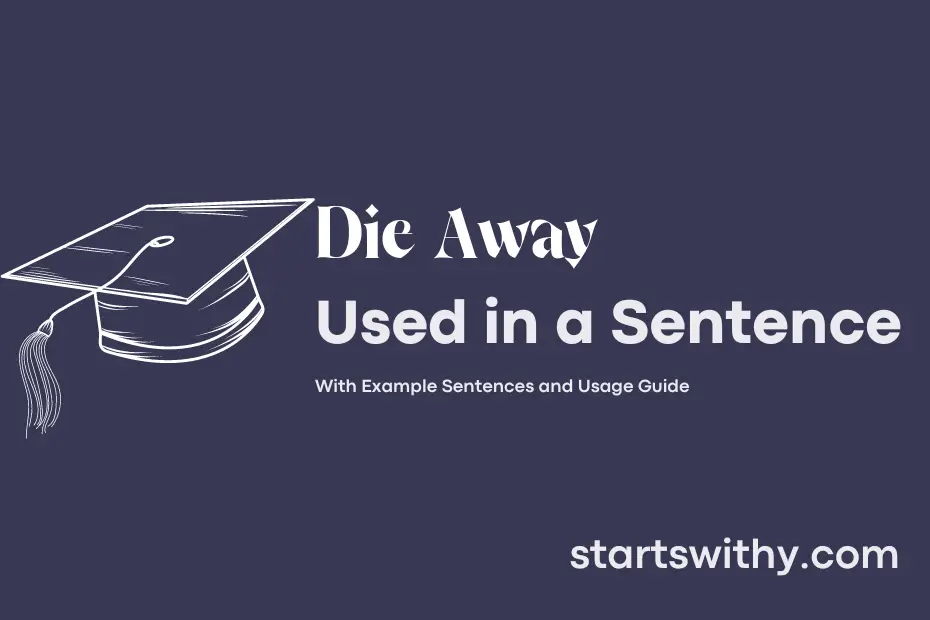Have you ever wondered what it means for a sound to “die away”? This literary term describes the gradual fading or decrease in volume of a noise or sound, eventually becoming inaudible to the listener.
In literature, when an author employs the phrase “die away,” they are often creating a sense of atmosphere or mood within a scene. By using this technique, writers can evoke emotions and emphasize the quietness, emptiness, or melancholy present in a particular moment.
7 Examples Of Die Away Used In a Sentence For Kids
- Die away goes the sound of the drum.
- Let’s listen to the birdsong die away.
- The echoes of our laughter will soon die away.
- Watch the colors in the sky die away as the sun sets.
- Can you hear the wind die away?
- The waves slowly die away as they reach the shore.
- Let’s wait for the storm to die away before we go outside.
14 Sentences with Die Away Examples
- The cheers of the crowd began to die away as the football match ended.
- I could hear the sounds of the festival die away as I walked back to my hostel.
- The excitement over the new movie release will eventually die away as more films are released.
- As the semester comes to an end, the stress of exams will slowly die away.
- The arguments between classmates will eventually die away as the semester progresses.
- The enthusiasm for joining a new club tends to die away after a few weeks.
- The loud music from the party next door finally started to die away after midnight.
- The buzz about the upcoming guest lecture will soon die away as more important events take place on campus.
- The energy in the classroom began to die away as the lecture went on for over two hours.
- The initial excitement about the college’s annual fest will die away once the anticipation fades.
- The chaos in the canteen will die away once everyone finishes their lunch.
- The drama surrounding a campus relationship will eventually die away as time passes.
- The chatter in the library will slowly die away as students focus on studying for their exams.
- The anticipation for the college trip will die away once the trip has ended.
How To Use Die Away in Sentences?
To use Die Away in a sentence, follow these steps:
-
Understand the meaning: “Die Away” means to diminish gradually or fade out completely. It is often used to describe how a sound, a sensation, or an emotion gradually becomes quieter or less noticeable.
-
Choose the context: Think about what you want to convey in the sentence. Do you want to describe a noise fading out, a feeling diminishing, or something else gradually disappearing?
-
Build your sentence: Start by identifying the subject (the thing that is fading away) and the action (dying away). For example, “The sound of the waves began to die away as we moved further from the shore.”
-
Place the main word correctly: Make sure to place “Die Away” in the correct position in your sentence to convey the fading or diminishing action clearly.
-
Practice and experiment: Try using “Die Away” in different types of sentences to get comfortable with its usage. You can also experiment with synonyms or variations of the phrase to see how they fit in different contexts.
Overall, using “Die Away” effectively in a sentence comes down to understanding its meaning and placing it correctly within your sentence structure to convey the gradual fading or diminishing action clearly.
Conclusion
In conclusion, the phrase “die away” is commonly used to describe the fading or diminishing of a sound or sensation over time. This term can be applied to various scenarios, such as the sound of music slowly dying away as a concert ends, or the sensation of pain fading as a headache subsides. “Die away” effectively captures the idea of something gradually becoming quieter, weaker, or less intense until it eventually ceases to exist.
Whether talking about the dwindling echoes of a thunderstorm or the softening of emotions with time, “die away” vividly portrays the gradual decline and eventual cessation of a particular phenomenon. By using this descriptive term, individuals can effectively convey the idea of something dwindling or fading out over a period, adding depth and imagery to their communication.



